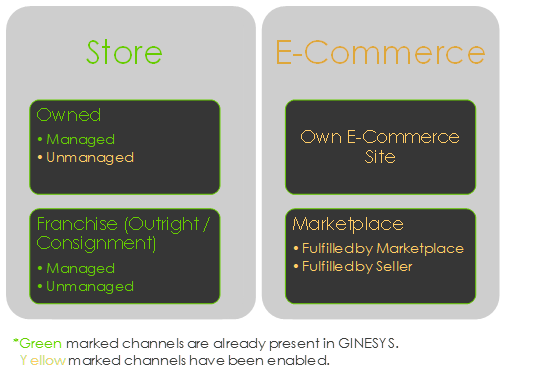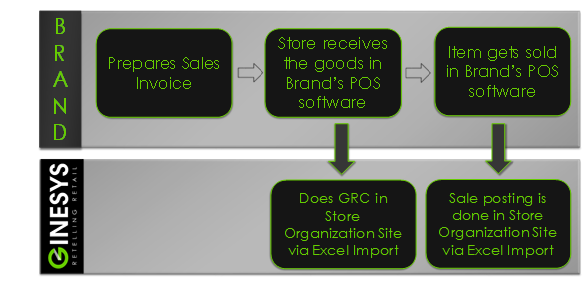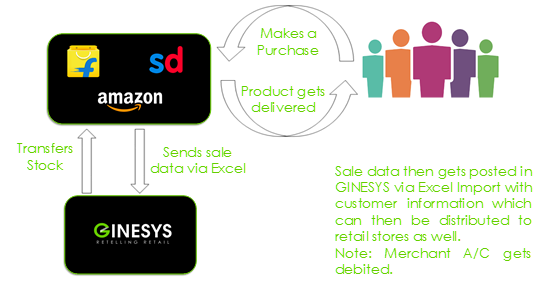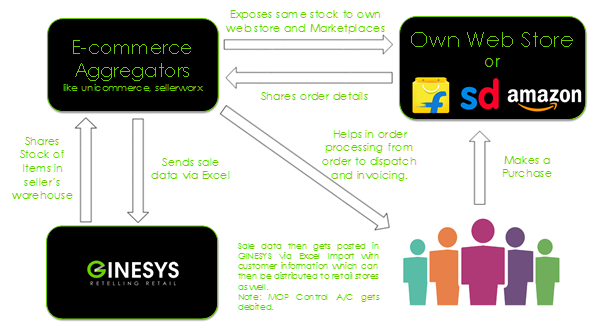In the current retail market scenario, there are different channels through which a sale is executed, i.e., Retail Stores and E-commerce Websites/Apps. However, GINESYS had a provision to enter sale information of only Retail Stores and not E-commerce sale. From the Ginesys HO Version 11.111.0, it is possible to update the same.
Channels enabled in GINESYS:
Demystifying the newly added Channels:
- Unmanaged Owned (COCO) Store sale: The store is owned by the organization but since the store is an Exclusive Brand Outlet (EBO), the POS software is integrated with Brand’s central database. Due to this Sale & Stock information was not available in GINESYS.
- E-commerce sale: We have classified the e-commerce sale on the basis of its "Fulfillment center", i.e., from where the goods/items shall be dispatched -
- Fulfilled by Marketplace
- Fulfilled by Seller (where sale can take place from marketplace as well as seller’s own web store).
Difference between "Fulfilled by Marketplace" and "Fulfilled by Seller"?
The major difference between the two is that the stock in case of fulfilled by marketplace is sent by the seller to marketplace’s warehouse. In case of fulfilled by seller the stock of the goods is in seller’s warehouse itself.
Process flow for Unmanaged COCO Store:
- Business Scenario - Consider a store which is owned by you but it is an exclusive brand outlet of brand 'ABC'. Due to this, 'ABC' brand shall enforce their software which shall sync information to their database. Previously, even if you wanted to keep your software, i.e., GINESYS updated with the receive/sale information of that store, there was no such provision for the same. Now after this update you can do so by creating a new organization site for that store and do normal Goods Receive and post the sale information by using the process specified below.
- Key Highlights -
- We will create an Organization Site (OS-OO-CM) for such outlets.
- Tax/VAT posting shall be done in exclusive mode.
- MOP Control A/C shall be debited until the transaction amount is received by Head Office.
Note: MOP Control A/C will be sub-ledgers of "others class" having AR/AP ledger tagged to it.
- Process Detail -
- On purchase of goods for that store from the Brand, goods receive document shall be created manually by connecting to that organization site.
- On sale of goods from that store in the Brand software, an excel can be generated from that store and can be imported in GINESYS using new import excel option into that organization site.
- On importing the sale, MOP Control A/C shall get debited and on receipt of money at HO, it can be set-off in AR voucher or via document adjustment.
- Sample Masters:
Site Name - Elgin Road Store (ABC Brand)
MOP Control A/C - Elgin Road Store (ABC) Control A/C
Process flow for Fulfilled by Marketplace E-commerce Sale:
- Business Scenario - Consider a scenario where you list your products in 'Flipkart'. Also, you send the goods to a Flipkart's warehouse, i.e., 'Bhiwandi Warehouse' for order and dispatch.
- Key Highlights -
- We will create a customer (consignment) and then unmanaged customer's site for such outlets.
- Tax/VAT posting shall be done as per the mode specified in customer master.
- Customer A/C shall be debited until the transaction amount is received by Head Office.
- Process Detail -
- GINESYS user transfer's stock from its warehouse to customer/marketplace site location.
- Consumer purchases goods from marketplace and the marketplace delivers those items from their warehouse itself to the consumer.
- Marketplace then shall share the sale information in excel format to GINESYS user who in turn shall import using new import excel option for that marketplace site.
Sample Values:
Site Name - Bhiwandi Warehouse - Flipkart
Customer Name - Flipkart
Process flow for Fulfilled by Seller E-commerce Sale:
- Business Scenario - Consider a scenario where you list your products in 'Flipkart'. But the order information is shared by Flipkart to you and you further process the order and dispatch.
- Key Highlights -
- We will create an Organization Site (OS-OO-CM) for such warehouses.
- Tax/VAT posting shall be done in exclusive mode.
- MOP Control A/C shall be debited until the transaction amount is received by Head Office from Marketplace.
Important information
Note: MOP Control A/C will be sub-ledgers of "others class" having AR/AP ledger tagged to it.
- Process Detail
- GINESYS exposes stock information of the organization site to third party 'E-commerce Aggregators'.
- 'E-commerce Aggregators' then further exposes same stock information to all the marketplaces / own web-store.
- Consumer purchases goods from marketplace/own web-store.
- This order information will get available in e-commerce aggregator website via their integrations with marketplaces/own web-store.
- Order processing to dispatch/invoicing needs to be done in E-commerce Aggregator's website.
- After invoicing, they will generate an excel which can be imported in GINESYS using new excel import option for that organization site.
- Sample Values:
Site Name - E-commerce Fulfillment Center
MOP Control A/C - Flipkart Control A/C
This article is a collation of all articles that will enable creation and management of Retail Sale through GINESYS in the mentioned order. Retail Sale is divided into two parts - Store and E-Commerce.
- Store - Store is a place of business usually owned and operated by a retailer. Sometimes owned and operated by a manufacturer or by someone other than a retailer. Goods and Services are sold primarily to ultimate consumers in the store.
Three types of stores are present in the Ginesys - Owned, Franchise (Consignment) and Franchise (Secondary). - Owned - A place of business usually owned and operated by a retailer or by a manufacturer or by someone other than a retailer.
- Franchise (Consignment) - The authorization of a Franchise Store is granted by the owner. The consignment shop and the owner split the profits after selling the items. If any item does not sell after a certain period of time, the owner has the ability to retrieve the items from the consignment shop. If the Franchise (Consignment) is Managed Store, then the price of the items (without MRP) will be decided by the owner. For the Unmanaged Franchise (Consignment), the price of the items might be decided by the store also.
- Franchise (Secondary) - The authorization of a Franchise (Secondary) Store is granted by the owner. The Franchises buy the items from the owner to resale but the owner does not claim the profit after selling. The price of the items (without MRP) might be decided by the Franchises.
- E-Commerce - E-commerce, an abbreviation for Electronic Commerce, is the platform for buying and selling of goods and services over an electronic network, primarily the internet. These business transactions occur either as Business-to-Business (B2B), Business-to-Consumer (B2C), Consumer-to-Consumer or Consumer-to-Business.
- Fulfilled by Marketplace - In this scenario the order items are maintained by a particular E-Commerce site.
- Fulfilled by Seller - In this scenario the order items are maintained by a particular Seller.
Retail Sale: Changes in menu name Version 12.8.0 - 2.8.0
- “Fulfilled by Seller” is now renamed as "Billing by Brand" because When the brand is selling goods and brand is liable to pay the output tax, then it should be posted in this menu.
- “Fulfilled by Marketplace” is now renamed as "Billing by Marketplace" because When the brand is sending goods to marketplace warehouse, marketplace is billing and marketplace is liable to pay the output tax, then it should be posted in this menu.




Add Comment